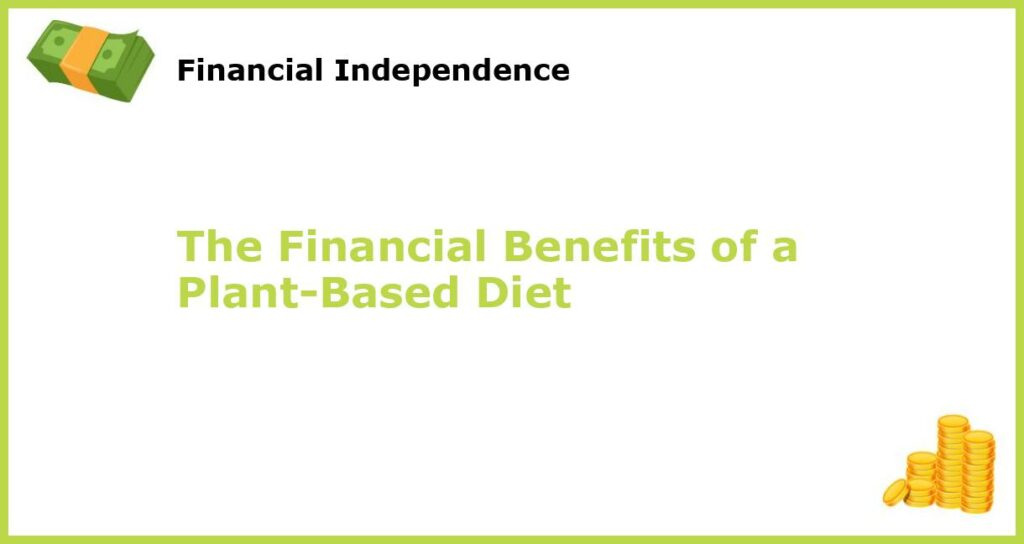Despite the common belief that healthy eating is expensive, a plant-based diet can be extraordinarily beneficial for your well-being and wallet. Adopting a plant-based lifestyle implies restricting or completely eliminating meat and dairy intake, thereby reducing the number of processed and packaged foods many individuals often consume. Apart from being cheaper, plant-based diets also boast a number of other financial benefits.
1. Lower grocery bill

Replacing animal-based food products with plant-based alternatives can help reduce your grocery bill. Staples like rice, beans, lentils, and pasta can all be bought in bulk and make for inexpensive meals. Moreover, in-season vegetables and fruits, though sometimes more expensive, can be purchased for less at a farmers’ market. Purchasing food in-season can save money as it is cheaper when the supply is more abundant. A great idea is to buy fruits and vegetables in bulk when they are in season, and then freeze or can them in order to use them throughout the year.
2. Less expensive healthcare

Plant-based diets have been linked with better health outcomes, including lower rates of heart disease, diabetes, and certain cancers. By avoiding or reducing meat and dairy consumption, individuals may also lower their risk for expensive health problems such as these, and in turn, save money on healthcare costs. Individuals can also reduce their medical bills through routine checkups that may detect and treat medical conditions before they become more severe and expensive.
3. Lower cost of environmental damage

Eating a plant-based diet can help reduce the amount of greenhouse gas emissions generated by the food industry. Methane gas, produced by cows and other livestock, is a potent contributor to climate change. By consuming fewer animal products, individuals can lessen their contribution to environmental damage and potentially reduce the associated costs. Eating plant-based alternatives reduces the amount of land, water, and energy needed to produce food, and also reduces the pollution associated with animal waste and fertilisers that are used to grow grains for animal feed.
4. Lower lifetime medical bills

Many chronic diseases, such as heart disease and diabetes, can be caused or are linked to high levels of meat and dairy consumption. Avoiding or reducing those foods in favor of plant-based options may delay or prevent the onset of these diseases, effectively saving individuals from a significant amount in lifetime medical bills. Choosing a plant-based diet helps in the prevention of chronic conditions, which would otherwise require constant attention, treatment and medication to manage.
5. Reduced food waste

More plant-based meals mean less food waste, as fruits and vegetables often have a longer shelf life than meat and dairy products. This can reduce the amount of money families need to spend on groceries each week and provide a more sustainable lifestyle. Plant-based diets encourage consumers to purchase local, fresh, whole fruits and vegetables, which not only lowers the grocery bill but also promotes healthier eating habits
6. Lower risk of food contamination
Food contamination can not only be harmful to health but also costly, both in terms of health and money. Meat and dairy products are more susceptible to bacteria like E. coli and salmonella, which can result in expensive medical bills and potential loss of income due to missed work. A plant-based diet reduces this risk as it eliminates the need for animal-derived foods that are more prone to contamination.
7. Lower risk of high cholesterol
Cholesterol-lowering medications can be expensive, and frequent medical checkups to monitor cholesterol levels can cost individuals and their insurance providers even more money. A plant-based diet may reduce the need for these medications and checkups through the benefits of whole fruits, vegetables, nuts and dietary fiber, effectively saving money over time. Plant-based alternatives are typically free of cholesterol and have lower levels of saturated and trans fats that contribute to the development of high cholesterol.
8. Decreased risk of joint pain
Arthritis and other joint problems can be expensive to treat, including the cost of medication, therapy, and potential surgical procedures. A plant-based diet may reduce the severity of joint pain, as it has been linked to reducing inflammation throughout the body. An anti-inflammatory diet of vegetables, fruits, whole grains, and nuts, can help ease inflammation and pain, therefore reducing the need for anti-inflammatory medications and medical procedures.
9. Reduced risk of obesity
Obesity is linked to a host of health problems, all of which can be expensive to treat. By reducing the amount of high-calorie meat and dairy products and emphasizing whole, plant-based foods, individuals may be able to maintain a healthy weight and avoid related health issues, including expensive weight-loss measures like bariatric surgery. Reduced risk of obesity on a plant-based diet can also lead to long-term savings by reducing the risk of developing associated health issues such as diabetes, heart disease, and hypertension.
10. Sustainable food production
Meat and dairy production, especially at industrial scales, can have significant impacts on surrounding communities and ecosystems. Plant-based diets, which utilize much less land and water, can help reduce these impacts and lead to more sustainable food production systems. This, in turn, has the potential over time to become a more cost-effective way of feeding humans, as it would be more resource-efficient and lead to more environmental sustainability.







